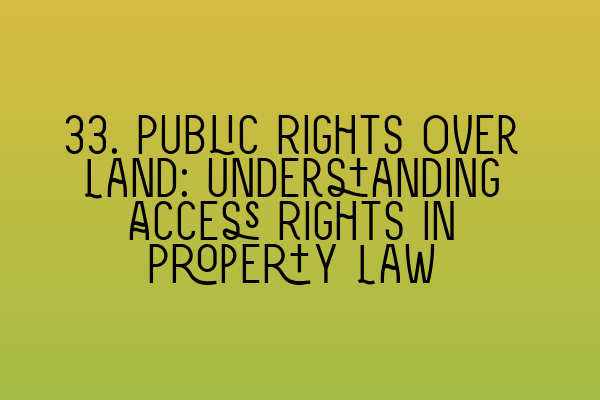Before we dive into the intricacies of access rights, it’s important to note that preparing for the SQE exams requires thorough knowledge of property law. If you are currently studying for the SQE 1 or SQE 2 exams, we recommend practicing with SQE 1 practice exam questions and taking advantage of SQE 2 preparation courses offered by SQE Property Law & Land Law. These resources will help you excel in your exams and advance in your legal career.
Now, let’s delve into the world of public rights over land and understanding access rights in property law.
Understanding Access Rights in Property Law
Access rights refer to the rights an individual or group has to enter or pass through a particular property. These rights can be classified into two main categories: public rights and private rights.
Public Rights Over Land
Public rights over land are rights that members of the public have to access certain areas or use specific routes across private land. These rights are often linked to historical usage, statutory provisions, or custom. Some common examples of public rights over land include:
- Right of Way: A right of way allows individuals to pass through a property, usually via a designated path or roadway, without necessarily having any other interest in the land itself. This right is often established through an express grant, implied grant, or by long-standing usage.
- Right to Roam: In certain areas, there are public rights to access and roam freely over particular types of land, such as mountains, moors, and heaths. These rights are known as “rights to roam” and are typically governed by specific legislation.
- Right to Fish: In some instances, individuals may have rights to fish in certain bodies of water located on private land. These rights are often associated with specific rivers, streams, or lakes and may be subject to certain restrictions or regulations.
It’s important to note that public rights over land can vary significantly depending on jurisdiction and local laws. If you’re studying for the SQE exams, it’s crucial to understand the specific regulations and legislations relevant to your jurisdiction. SQE 1 preparation courses offered by SQE Property Law & Land Law can provide you with a comprehensive understanding of property law principles and their applications.
Implications of Access Rights
Understanding and managing public rights over land is crucial for property owners and those looking to acquire or develop land. It’s essential to recognize the potential implications that access rights can have on property value and use.
For property owners, granting access rights can impose certain obligations and restrictions. It’s necessary to consider the impact on the property’s privacy, security, and potential limitations on development. On the other hand, denying or obstructing public access rights can lead to legal disputes and potential liabilities.
For those looking to acquire or develop land, understanding existing public rights over the land is essential. Any proposed development plans must consider these rights and comply with the relevant laws and regulations. Failure to do so can result in legal challenges, delays, or even the cancellation of the development project.
Ultimately, public rights over land require a delicate balance between private property rights and public access. As a legal professional, it is essential to have a thorough understanding of these rights to provide accurate advice to clients and navigate potential disputes effectively.
To enhance your preparation for the SQE exams, consider utilizing practice mocks and quizzes. SQE 1 practice mocks FLK1 and FLK2 provided by SQE Property Law & Land Law are valuable resources to test your knowledge and familiarize yourself with the format of the exams. Additionally, SQE 2 preparation courses can help you build a strong foundation in property law principles and ensure you’re fully prepared for the SQE exams.
Conclusion
Public rights over land, specifically access rights, are an integral part of property law. Understanding these rights is crucial for all parties involved, from property owners to aspiring legal professionals. By grasping the implications of public rights over land and navigating potential disputes effectively, you will provide invaluable guidance to clients and excel in your legal career.
To stay updated on the latest information regarding SQE exams and exam dates, be sure to check out the SRA SQE exam dates provided by SQE Property Law & Land Law. These dates will help you plan your study schedule effectively and ensure you’re well-prepared for success in your exams.
Remember, preparation is key, and SQE 1 preparation courses, together with SQE 1 practice exam questions and SQE 2 preparation courses, will provide you with the necessary knowledge and resources to confidently tackle the SQE exams and thrive in your legal career.
